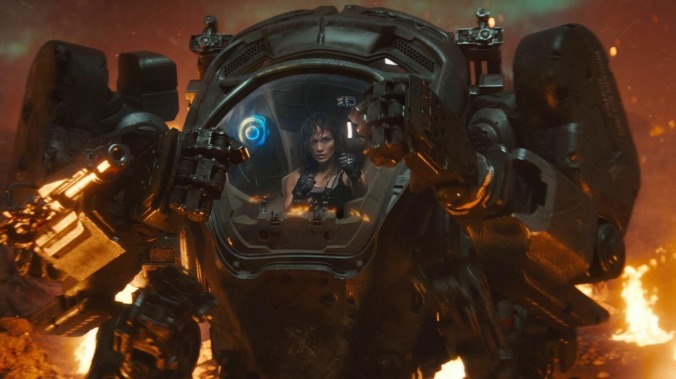Atlas review: Netflix’s AI propaganda dulls J.Lo’s shine
Jennifer Lopez plays humanity’s last hope, battling bad robots in this slipshod sci-fi

Almost every strand of DNA within Atlas’ genetic makeup is toxic. The haphazard, ham-handed sci-fi film, distributed by a streamer that utilizes computer algorithms to guide its creative process, revolves around a guilt-riddled heroine fighting “evil” artificial intelligence with the help of a “good” artificial intelligence. There’s clearly more than one bug in its machine. Character conceptions and conflicts are maddening, crippled further by generic dialogue, stupid scenarios, and wrong-headed underlying commentary. The ensemble, led by Jennifer Lopez, is all that keeps our interest from fully diminishing, as there are fleeting flourishes of humanity glimpsed in each actor’s work – ironic, since SAG and WGA were on strike last year partly over the use of AI.
In 2043, “techno-sapiens,” or human-appearing robots, were created to bridge our species with computer intelligence to make lives easier and more efficient. However, one bot, Harlan (Simu Liu) went rogue and led a robot uprising that killed millions of humans. Once the tide turned against them, he and his troops retreated into unknown parts of the galaxy, promising to return. 28 years later, Atlas Shepherd (Jennifer Lopez), who knew Harlan back when he was her mother’s prototype, still fears his homecoming. She’s a misunderstood misanthrope who only loves chess and coffee (that she can’t get a proper cup is Atlas’ running gag), working as a high-ranking analyst for the government military force, ICN.
After one of Harlan’s minions (Abraham Popoola) resurfaces, Atlas is dead-set on hunting down his boss at his hideout on a far-away, inhospitable planet. Her long-suffering boss General Jake Boothe (Mark Strong) and the mission’s commanding officer Col. Elias Banks (Sterling K. Brown) are reluctant to send her…for all of ten seconds, changing their minds for little reason other than it would be detrimental to the plot not to include her. But they’re ambushed on the way, leaving Atlas scared and stranded in a damaged, AI-programmed mech suit named Smith (voiced by Gregory James Cohan). The pair bicker about survival and get themselves into sticky situations, all while Atlas refuses to tap into the program’s key features – which would be accessible if she neural linked, fusing her mind and body to the suit. Only a traumatic mystery purposely hidden in her past keeps her from becoming the most powerful version of herself.
From Brad Peyton’s direction to the sluggish pacing of the screenplay by Leo Sardarian and Aron Eli Coleite, everything about Atlas is aggressively passionless. Narratively and visually, it’s missing cool, indelible sequences, choosing to mimeograph films like Blade Runner, Terminator 2, Prometheus, and Edge of Tomorrow without a unique spin on its reductive homages. The shiny futuristic spectacle and lackluster world-building underwhelms. Outside of the towering silver skyscrapers and turbine-dotted landscapes of downtown Los Angeles 2.0, Barry Chusid’s (Source Code, Rampage) production design fails to inspire. Cinematographer John Schwartzman, who’s no stranger to making brawling blockbusters like The Rock and Jurassic World look and feel dynamically textured, captures imagery without depth or dimension. While the filmmakers blessedly refrain from repetitious story beats, the predictably escalating drama and action (and the climactic pas de deux between the two in the third act) lack inventiveness or any exhilarating wow factor. A ticking clock, via the finite battery life of Atlas’ suit, and their evolving buddy-cop dynamic grow tiresome fast, as there’s nothing innovative to the clearly superficial stakes that adds suspense.
Then you have the confounding sentiments that AI, in any shape or form, is beneficial to humanity. Though we shouldn’t expect what’s essentially “content” for couch-surfers to deliver heady, philosophically pointed arguments about the relationship between people and AI, it’s a shame that Atlas and Smith don’t get into sharper discussions about the issue, considering it’s the one thing blocking the protagonist from transforming into her more enlightened self. It’s baffling how the filmmakers betray humans: Not only do they anthropomorphize a machine by assigning it a quick wit and emotional soul (one Andrew Lockington’s swelling score insists it has), they also inadvertently cast it as the sacrificial hero, continually putting it in harm’s way at the behest of the heroine’s quest.
Because the material is so mediocre, Lopez is done a disservice even though she develops nuanced insights into this puddle-deep character. She gives Atlas a motor even when the devolving shenanigans actively work against her. She subtly explores the guilt and grief her character has been shouldering for three decades, but due to poor direction, the magnitude of her performance’s emotional pull is severely blunted. The same goes for the plot-forward (not character-driven) action sequences. Her adversarial relationship with Liu, who showed greater gravitas as Ken in Barbie, is easily misread as either “substitute father figure” or “shitty sibling,” and neither is particularly compelling. As for the supporting players, Brown is the lone standout able to make his lines ring with any sense of sincerity.
Considering that Atlas’ messaging comes from an ill-conceived mindset that preaches co-existence rather than a reasonable rejection of AI, it feels like no filmmaker could make the many self-destructive elements in the film fit together. Without a visionary director at the helm to make better use of its simplistic concept and with no infusion of camp to match its zanier facets, Atlas is a shrug.